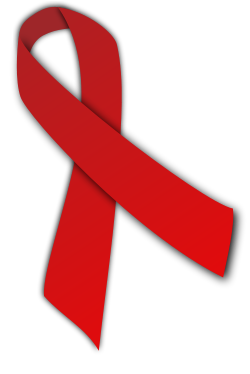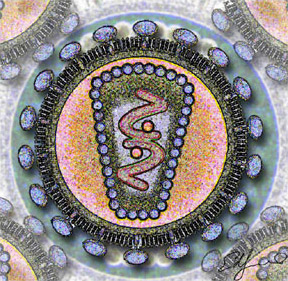HIV/AIDS
Editor-In-Chief: Prab R Tumpati, MD
Obesity, Sleep & Internal medicine
Founder, WikiMD Wellnesspedia &
W8MD medical weight loss NYC and sleep center NYC
| HIV/AIDS | |
|---|---|

| |
| Synonyms | N/A |
| Pronounce | N/A |
| Specialty | N/A |
| Symptoms | Fever, swollen lymph nodes, sore throat, rash, muscle pain, headache |
| Complications | Opportunistic infections, cancers |
| Onset | 2-4 weeks after exposure |
| Duration | Lifelong |
| Types | N/A |
| Causes | Human immunodeficiency virus (HIV) |
| Risks | Unprotected sex, needle sharing, mother-to-child transmission |
| Diagnosis | HIV test |
| Differential diagnosis | N/A |
| Prevention | Safe sex, needle exchange program, Pre-exposure prophylaxis (PrEP) |
| Treatment | Antiretroviral therapy (ART) |
| Medication | N/A |
| Prognosis | With treatment, near-normal life expectancy |
| Frequency | 38 million people worldwide (2020) |
| Deaths | N/A |
HIV/AIDS is a disease caused by the Human immunodeficiency virus (HIV), which damages the immune system and can lead to the development of Acquired immunodeficiency syndrome (AIDS). HIV is primarily transmitted through unprotected sex, sharing contaminated needles, blood transfusions, and from mother to child during birth or breastfeeding. HIV/AIDS has been a global pandemic since the early 1980s, and although significant progress has been made in treatment and prevention, it remains a major public health issue.
Symptoms
HIV infection can be divided into three stages: acute HIV infection, chronic HIV infection, and AIDS.
Acute HIV infection
The acute stage occurs within 2 to 4 weeks after infection and may include symptoms such as:
- Fever
- Fatigue
- Swollen lymph nodes
- Sore throat
- Headache
- Muscle aches
- Joint pain
- Skin rash
- Night sweats
Chronic HIV infection
During the chronic stage, the virus continues to multiply in the body but at a slower rate. This stage can last for several years, during which an individual may not experience any symptoms.
AIDS
AIDS is the most advanced stage of HIV infection and is characterized by a severely weakened immune system. Symptoms can include:
- Rapid weight loss
- Diarrhea lasting more than a week
- Sores in the mouth, genitals, or anus
- Pneumonia
- Persistent cough
- Memory loss, depression, or neurological disorders
- Opportunistic infections and cancers
Transmission
HIV is primarily transmitted through:
- Unprotected sexual contact with an HIV-positive individual
- Sharing needles or syringes with an HIV-positive person
- Blood transfusions from an HIV-positive donor
- Transmission from an HIV-positive mother to her child during childbirth or breastfeeding
Prevention
Prevention methods include:
- Practicing safe sex using condoms
- Needle exchange programs
- Pre-exposure prophylaxis (PrEP) for high-risk individuals
- Regular HIV testing and counseling
Diagnosis
HIV is diagnosed through a blood test that detects the presence of the virus or its antibodies. Early diagnosis and treatment are crucial in managing the disease and reducing the risk of transmission.
Treatment
There is currently no cure for HIV/AIDS, but antiretroviral therapy (ART) can help control the virus and prevent its progression to AIDS. ART involves a combination of antiretroviral medications that work to suppress viral replication and preserve immune function.
History
The HIV/AIDS pandemic began in the early 1980s, with the first cases reported in the United States. The epidemic quickly spread worldwide, predominantly affecting Sub-Saharan Africa. HIV/AIDS has claimed millions of lives, and despite progress in treatment and prevention, it remains a significant global health issue.
Societal impact
The HIV/AIDS pandemic has had a profound impact on societies worldwide. The disease has disproportionately affected marginalized populations, including men who have sex with men, intravenous drug users, and sex workers. The pandemic has also strained healthcare systems, contributed to economic hardship, and led to widespread stigma and discrimination against people living with HIV/AIDS.
Research and development
Scientists continue to research new treatments and potential vaccines for HIV/AIDS. Developments in antiretroviral therapy have dramatically improved the quality of life for people living with the virus, and ongoing research aims to find a cure or a functional cure that would allow individuals to maintain viral suppression without medication.
Living with HIV/AIDS
People living with HIV/AIDS can lead healthy and fulfilling lives with proper medical care and support. Adherence to antiretroviral therapy (ART) is crucial to maintain viral suppression and prevent the development of drug resistance. Regular medical check-ups, maintaining a healthy lifestyle, and practicing safe sex are essential components of managing the disease.
HIV/AIDS and mental health
The psychological impact of HIV/AIDS can be significant, with individuals facing issues such as anxiety, depression, and stigma. Mental health support, including therapy and counseling, can help people living with HIV/AIDS cope with these challenges and improve their overall well-being.
Advocacy and support
Numerous organizations and advocacy groups work to support people living with HIV/AIDS, raise awareness, and fight for the rights of affected individuals. Some well-known organizations include amfAR, AIDS United, and The Elizabeth Taylor AIDS Foundation.
Global efforts
International initiatives such as PEPFAR (the President's Emergency Plan for AIDS Relief), the Global Fund to Fight AIDS, Tuberculosis, and Malaria, and UNAIDS have contributed to significant progress in the global response to HIV/AIDS. These efforts have led to improved access to treatment, prevention programs, and support for affected communities.
Educational resources
It is essential to educate individuals and communities about HIV/AIDS to promote prevention, early diagnosis, and reduce stigma. Schools, healthcare providers, and community organizations play a vital role in providing accurate information and raising awareness about the disease.
Further reading
- World Health Organization. (2021). HIV/AIDS fact sheet. Retrieved from https://www.who.int/news-room/fact-sheets/detail/hiv-aids
- Centers for Disease Control and Prevention. (2021). HIV basics. Retrieved from https://www.cdc.gov/hiv/basics/index.html
- UNAIDS. (2021). Global HIV & AIDS statistics — 2021 fact sheet. Retrieved from https://www.unaids.org/en/resources/fact-sheet
See also
- Pre-exposure prophylaxis
- Post-exposure prophylaxis
- Opportunistic infection
- Antiretroviral therapy
- List of AIDS-related topics
| Sexually transmitted infections (STI) | ||||||||||
|---|---|---|---|---|---|---|---|---|---|---|
|
| Diseases of poverty | ||||||
|---|---|---|---|---|---|---|
|
| Infectious diseases – viral systemic diseases | ||||||||||
|---|---|---|---|---|---|---|---|---|---|---|
|
| Immune disorders: Lymphoid and complement immunodeficiency (D80–D85, 279.0–4) | ||||||||||||||||
|---|---|---|---|---|---|---|---|---|---|---|---|---|---|---|---|---|
|
Transform your life with W8MD's budget GLP-1 injections from $125.
W8MD offers a medical weight loss program to lose weight in Philadelphia. Our physician-supervised medical weight loss provides:
- Most insurances accepted or discounted self-pay rates. We will obtain insurance prior authorizations if needed.
- Generic GLP1 weight loss injections from $125 for the starting dose.
- Also offer prescription weight loss medications including Phentermine, Qsymia, Diethylpropion, Contrave etc.
NYC weight loss doctor appointments
Start your NYC weight loss journey today at our NYC medical weight loss and Philadelphia medical weight loss clinics.
- Call 718-946-5500 to lose weight in NYC or for medical weight loss in Philadelphia 215-676-2334.
- Tags:NYC medical weight loss, Philadelphia lose weight Zepbound NYC, Budget GLP1 weight loss injections, Wegovy Philadelphia, Wegovy NYC, Philadelphia medical weight loss, Brookly weight loss and Wegovy NYC
|
WikiMD's Wellness Encyclopedia |
| Let Food Be Thy Medicine Medicine Thy Food - Hippocrates |
Medical Disclaimer: WikiMD is not a substitute for professional medical advice. The information on WikiMD is provided as an information resource only, may be incorrect, outdated or misleading, and is not to be used or relied on for any diagnostic or treatment purposes. Please consult your health care provider before making any healthcare decisions or for guidance about a specific medical condition. WikiMD expressly disclaims responsibility, and shall have no liability, for any damages, loss, injury, or liability whatsoever suffered as a result of your reliance on the information contained in this site. By visiting this site you agree to the foregoing terms and conditions, which may from time to time be changed or supplemented by WikiMD. If you do not agree to the foregoing terms and conditions, you should not enter or use this site. See full disclaimer.
Credits:Most images are courtesy of Wikimedia commons, and templates, categories Wikipedia, licensed under CC BY SA or similar.
Contributors: Prab R. Tumpati, MD




